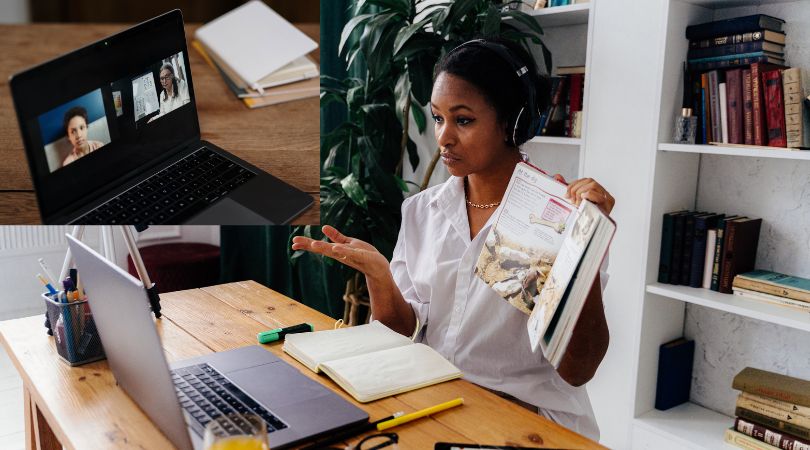Munaza Mahmood contributed this research paper to Ibex Times as part of her Master of Studies in Education at Karachi University. She currently serves as an educator at Habib Girls School in Karachi. She can be reached at munaza.mahmood@habibschools.edu.pk.
Abstract
This study aims to highlight the challenges faced by higher secondary school educators in remote teaching during the COVID-19 pandemic and analyze their attitudes towards online teaching. The study surveyed 100 college teachers from Karachi, Islamabad, and Gilgit-Baltistan, including participants from Habib Girls’ School, Karachi, Concordia College, Islamabad, and Aga Khan Higher Secondary School, Gilgit. Using simple random sampling and descriptive analysis, the study concludes that teachers were under unprecedented pressure, having to adapt to unfamiliar technologies. It recommends that colleges provide training to build teachers’ confidence in conducting online classes in similar situation that might arise in future. Additionally, parental involvement is crucial for the effective and real learning of students in remote settings.
Keywords: Challenges, Remotely, Higher Secondary Educators
Table of Content
1. Introduction
2. Research Objectives
3. Research Questions
4. Literature Review
5. Research Methodology
6. Data Analysis
7. Results and Interpretation
8. Findings and Conclusion
9. Recommendations
10. References
Introduction
Schools, colleges, universities, and all other educational institutions were closed after the Covid-19 pandemic erupted and spread all over the world. It resulted in a transformative and eye-opening health crisis that profoundly reshaped the world. People who had never thought of the possibility of being socially distanced from their friends, family members, and loved ones; had to stay in quarantine and lockdown for a long period of time. Flights world wide were called off followed by closer of airports all to prevent spread of the virus from abroad. It felt like the era of the stone age when it was so tough to reach out to the other person. Visiting someone was a tale of another time. Nevertheless, the Covid-19 period was distinct from the Stone Age, as the internet played a crucial role in keeping people connected. While the internet served as a vital tool for communication, people still faced an incredibly challenging time. Some got stuck in other countries as they were vacationing or studying there. Months went by like this but there was not much difference until countries believed that the situation was under control. It was in the last two weeks of the March 2020 when almost every state had locked down enforced to prevent the virus. The Covid-19 pandemic broke out in December 2019 in Wuhan city in the Hubei Province of central China from where it quickly spread across the world.
On 12 March, WHO (World Health Organization) announced that it was high time that the governments across the world should take preventive measures. Social distancing became the new norm, and restrictions were imposed on social gatherings such as weddings, concerts, and other large events. Similarly, travelling was also banned. People were asked to not visit hospitals and instead take help from doctors through online platforms. People were advised to visit doctors only in case of extreme emergencies. Additionally, parents were instructed not to send their children to school under any circumstances. As a result, education was significantly impacted, with schools remaining closed for an extended period. Consequently, face-to-face learning was suspended.
All around the world, the education system suffered drastically. Even within countries like Pakistan, the system of lockdown was implemented in order to avoid the drastic and deadly spread of Coronavirus. Parents became extremely worried about what will happen to the future of their kids. But the main question which this pandemic brought with it was; what is the purpose of learning this knowledge which is not even going to help us in a fight off with plagues and pandemics like these? More and more students were seen asking this question and thinking about this particular aspect. Are these history and sociological theories important? Or, is it more important to find ways of understanding the new future? When the studies have been dismissed and the education system has somewhat collapsed, then are there any chances of having a normal future? Because that is going on currently in the entire world, it almost seems impossible without any exaggeration that there are not many chances of successful citizens with a good education in the near future. Also, teachers are now very much stressed as to how they are supposed to teach their students. Online classes and studies are not everyone’s cup of tea as all are used to having the face to face classes. Now, teachers have to find various engaging ways through which they can grab the attention of students in online classes.
Objectives
The objectives of the survey are as follows:
- To investigate the challenges faced by higher secondary teachers during teaching remotely.
- To study the applications and resources used by mostly higher secondary teachers during online teaching in Pakistan.
- To analyze the behavior of higher secondary teachers towards online teaching.
- To analyze the importance of traditional method of learning
Research Questions
- How many tHow many teachers are trained in or open to learning new technologies for teaching?
- How many teachers actively support and promote remote teaching methods?
- Which applications or software are most commonly used by higher secondary teachers for remote teaching?
- How many teachers find traditional classroom teaching more convenient compared to remote teaching?
- Do you feel hesitation in adopting remote teaching during the pandemic?
Literature Review
Schools, schools, colleges, and each other instructive establishment have been closed close since the pandemic hit the world. It has been an enlightening episode that turned the world around. Individuals who have never thought about the chance of being isolated from their companions, families, or friends and family; needed to remain isolate and lockdown for a truly extensive stretch of time. Flights were canceled and later on, air terminals were closed down with the goal that nobody can go around. It seemed like the period of stoneage when it was so difficult to contact the other individual. Visiting somebody was a story of another time (Malik, 2020).
In any case, in this time, there is a web that interfaces us however individuals needed to confront incredibly difficult stretch. Some stalled out in different nations as they were traveling or concentrating there. Months passed by like this however there was very little distinction until nations accepted that the circumstance is leveled out. The entirety of this occurred in March 2020. It is supposed to be China in which the pandemic “Coronavirus” began at first. Notwithstanding, with the progression of time, it spread wherever around the planet (Noor et al., 2020).
On 12 March, WHO (World Health Organization) declared that ample opportunity has already passed that administration of each state and nation should take preventive measures. Social separation turned into a new standard. Limitations were set up for parties, weddings, shows, and other huge occasions. Voyaging was additionally restricted. Individuals were approached to not visit medical clinics and take help from specialists through online stages. Just on account of the outrageous crisis, at that point, individuals should visit specialists. Guardians were approached to not send their youngsters to schools at any expense. Studies were profoundly influenced as instructive establishments were shut for an expanded timeframe. This implies that up close and personal learning was suspended (Rehman, 2020).
All around the planet, the schooling framework endured radically. Indeed, even inside nations like Pakistan, the arrangement of lockdown was actualized to stay away from the extraordinary and lethal spread of Coronavirus. Guardians turned out to be very stressed over what will befall the fate of their children. Yet, the fundamental inquiry which this pandemic carried with it was; what is the reason for learning this information which isn’t in any event, going to help us inward off with maladies and pandemics like these? An ever-increasing number of understudies were seen posing this inquiry and contemplating this specific angle. Are these sets of experiences and sociological hypotheses significant? Or then again, is it more critical to discover methods of understanding the new future? When the investigations have been excused and the instruction framework has to some degree imploded, at that point are there any odds of having a typical future? (“Educational Response to COVID-19”, 2021)
Since that is going on right now in the whole world, it nearly appears to be unthinkable with no misrepresentation that there are very few odds of fruitful residents with well-rounded schooling soon. Additionally, educators are currently, in particular, stressed regarding how they should show their understudies. Online classes and studies are not every tea as all are utilized to of having vis-à-vis classes. Presently, educators need to discover different connections with courses through which they can command the notice of understudies in online classes (Anwar et al., 2020).
Teachers are the ones who suffered a lot in this pandemic. There are various reasons behind this statement. Without any exaggeration, it is obvious that teachers being human and family people, have to spend time with their family as well. Some of them have to take care of kids as well as their homes. In addition to that, they have to find a peaceful quiet corner in their homes where they can make a set up for teaching their students through online platforms (Farooq et al., 2020).
Moreover, the reason why teachers suffered the most is that there were a lot of teachers that are old and are not fully aware of how the internet works. There are teachers in underdeveloped countries who never had so many resources that they ever get to understand the internet and its bits. Now, in this pandemic when these teachers had to work with the help of the internet, it seemed such a hard task for them. Students are so advanced that they made fun of the teachers. Slang languages, shutting off microscopes, cheating in online exams, screenshots, and playing games while having online classes are some of the examples of issues that both teachers and parents faced (Malik, 2020).
Moving further, those who did not have these resources, suddenly have to invest a lot in order to be present in online classes. The ratio of teachers who are totally unaware of the new advanced system of education had to suffer a lot. For one, they had to invest in resources like buy a laptop, microphone, and headphones then they had to have good working internet. After having all of these things, they have to take help from their kids or others who can teach them how things work around here. Zoom, Skype, WhatsApp as well as other platforms that schools use for online education (Malik, 2020).
Research Methodology
In this research quantitative approach has been applied to obtain results. Quantitative research generates numerical data or data that can be converted into numbers for a statistical review. The population that has been selected for this research study is 100 teachers of private sector colleges. This research has been conducted during pandemic. Due to closure of institutions, convenience sampling, a kind of non-probability sampling has been used. In this research questionnaire method (closed-ended) has been used.
Data Analysis
A good selection of data analysis method can provide a high quality data outcome so it should be selected appropriately. There are many techniques for data analysis in quantitative research and the technique this research will use to analyses data is Descriptive testing.
Results and Interpretations
The participants of the study are teachers of private sector colleges. These results show the significance of technology, their encouragement towards remote teaching and the challenges which they faced in the entire period. Although remote learning cannot replace traditional method of learning but it’s very important to have knowledge of different software in this digital era. The participants of the study are asked with the potential answering of certain questions with regards to the usage of technology during remote teaching and their answers about the questions are potentially combined together in order to formulate the results in the form of graphical patterns in order to better illustrate their opinions in the combined format (Figure 1-5).
The first question is about the teachers training or they are willing to learn technology, and most of the participants have clearly indicated that 72% teachers are well trained or willing to learn more about technology.17% of the participants are disagreed with the statement and rest of others are not sure about it.
(Figure-1)

The second question is about the teacher’s attitude towards remote teaching, approximately 55% teachers are agreed with the statement that they are encouraging remote teaching. 29% teachers are disagreed with the statement and they are not comfortable with online teaching strategy.
Figure-2

The third question of this study show the application and software used by mostly teachers during pandemic. This graph is indicating that 69 % teachers of public and private sector colleges have used zoom software for remote teaching, it was the most widely software used by mostly teachers. 26% of them have used Google meet and WhatsApp for conducting their classes. Only 1% teachers have used skype for online teaching.
Figure-3

The 4th question of this study is about the importance of traditional method of teaching and their attitude towards these mode of teaching. This study indicates that 41% teachers think that mostly teachers find the traditional method more convenient than teaching remotely.
Figure-4

The 5th question of this study is about the teachers’ hesitation towards remote teaching during Covid-19. The results show that 34% teachers are not feeling hesitated to teach remotely, 27% teachers agreed with the statement that they feel hesitated in teaching online. 41% are not confirmed about it.
Findings and Conclusion
This pandemic i.e. COVID’19 has been hectic and tough for a lot of people, especially for doctors and teachers. These two professions have suffered a lot. It is no exaggeration to say that students are also the ones who have their futures at stake because of this pandemic. They are not allowed to go to schools, colleges, or universities. How are they going to get their degrees on time? Moreover, if we look at it from this one perspective i.e. when students are not getting any practical education then how are they going to perform in their particular fields in real life? For instance, there are engineers that are graduating this year but due to lockdown and every business being shut, how are they ever going to understand the practical work of their fields? (Malik, 2020)
Another thing which we find out in this study is that teachers are being pressurized more than ever during this pandemic. They have to learn those things which they have never been comfortable with. As per our findings, most of the teachers in Pakistan are either in their late 30s or early 40s. They are finding it hard to understand at this age how laptops work and this software like Zoom can connect them virtually with other kids. Most of these teachers feel extremely hesitant in working online because students in Pakistan make it difficult for them to have a professional atmosphere in online classes (Farooq et al., 2020).
In addition to this, the power outrage in Pakistan makes it really tough for teachers to work in peace. There have been incidents that while a class is in process, some people suddenly lose the connection because of a power shutdown. At times, teachers fail to conduct a full class on time. The reason behind being internet issues or cable faults. They are so unsure of how things work that students keep making their fun if they struggle with webcams and microphones. There are cities and villages where it is extremely tough and next to impossible for teachers to conduct classes online (“Educational Response to COVID-19”, 2021). Because people cannot afford the internet or laptops. Some schools have failed to train their teachers on time; therefore, they could not conduct classes online and had to take classes on WhatsApp by sending voice notes. Now, students who have been working like this usually focus on other applications on mobile phones rather than paying attention to the teacher’s recording. Tests and exams conducted like this do not show the actual credibility of the students because cheating is so common in this process (Anwar et al., 2020).
Recommendations Based on Findings
The research that we have conducted provides a vast platform for other researchers to conduct a study in this direction. As this pandemic is currently in process, it is important to have authentic research to be carried out so that people can study and take vital recommendations out of it. The results which we have come across let us suggest that it is important for teachers to be trained by their respective colleges. It will develop confidence in them to take online classes. Moreover, they were given time to arrange resources without pressurizing them to do it within a day or two. Students should also be supervised by their parents from time to time in order to check if they are paying attention to their studies. It will help the teachers in working progressively. For this purpose, parents and teachers should stay connected with one another so that they can work on the students with unity. Teaching in remote conditions is not an easy task. Parents have to participate as well for the betterment of their children. One teacher cannot do everything by sitting in front of the camera. If parents take a proper interest in the studies of their children then they can make sure students are working on exams with all honesty and they are not passing time anywhere else while showing that they are studying on their laptops or computers.
References
1. Anwar, M., Khan, A., & Sultan, K. (2020). THE BARRIERS AND CHALLENGES FACED BY STUDENTS IN ONLINE EDUCATION DURING COVID-19 PANDEMIC IN PAKISTAN Citation metadata. Gomal University Journal Of Research. Retrieved 17 February 2021, from https://go.gale.com/ps/anonymous?id=GALE%7CA629071842&sid=googleScholar&v=2.1&it=r&linkaccess=abs&issn=10198180&p=AONE&sw=w.
2. Educational Response to COVID-19. Aku.edu. (2021). Retrieved 17 February 2021, from https://www.aku.edu/iedpk/Pages/Covid-19.aspx.
3. Farooq, F., Rathore, F., & Mansoor, S. (2020). Challenges of Online Medical Education in Pakistan During COVID-19 Pandemic. Journal Of The College Of Physicians And Surgeons Pakistan, 30(6), 67-69. https://doi.org/10.29271/jcpsp.2020.supp1.s67
4. Malik, R. (2020). Challenges and opportunities for Pakistan education systems in the COVID-19 response – The Education and Development Forum (UKFIET). The Education and Development Forum (UKFIET). Retrieved 17 February 2021, from https://www.ukfiet.org/2020/challenges-and-opportunities-for-pakistan-education-systems-in-the-covid-19-response/.
5. Noor, S., Ali, M., & Husnine, S. (2020). Performance of Online Classes in Lahore, Pakistan During Covid‐19. Performance Improvement, 59(9), 33-42. https://doi.org/10.1002/pfi.21938
6. Rehman, A. (2020). Challenges to Online Education in Pakistan During COVID-19 & the Way Forward. AIJ R Reprints, 1. https://doi.org/10.13140/RG.2.2.17222.70726















Thank you for sharing with us your Content is awesome and informative. check out all top schools in Noida